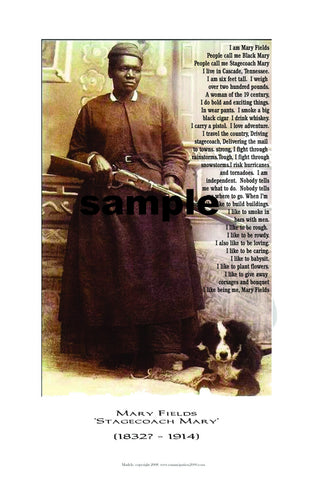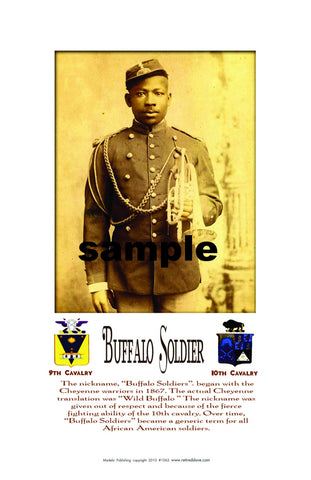Bass Reeves # 1673
$ 10.00
Caption from poster__
Bass Reeves
“ Born to slave parents in 1838 in Paris, Texas, Bass Reeves would become the first black U.S. Deputy Marshal west of the Mississippi River and one of the greatest frontier heroes in our nation’s history.
Owned by a man named George Reeves, a farmer and politician, Bass took the surname of his owner, like other slaves of the time. Working alongside his parents, Reeves started out as a water boy until he was old enough to become a field hand.
A tall young man, at 6’2”, with good manners and a sense of humor, George Reeves later made him his personal companion and body servant when Bass was older. When the Civil War broke out, Texas sided with the Confederacy and George Reeves went into battle, taking Bass with him.
It was during these years of the Civil War that Bass parted company from his "master,” some say because Bass beat up George after a dispute in a card game. Others believe that Bass heard too much about the "freeing of slaves” and simply ran away. In any event, Bass fled to Indian Territory where he took refuge with the Seminole and Creek Indians. While in Indian Territory, Reeves honed his firearm skills, becoming very quick and accurate with a pistol. Though Reeves claimed to be "only fair” with a rifle, he was barred on a regular basis from competitive turkey shoots.
Bass Reeves, U.S. Deputy Marshal
Bass Reeves
"Freed” by the Emancipation Proclamation in 1863 and no longer a fugitive, Reeves left Indian Territory and bought land near Van Buren, Arkansas, becoming a successful farmer and rancher. A year later, he married Nellie Jennie from Texas, and immediately began to have a family. Raising ten children on their homestead -- five girls and five boys, the family lived happily on the farm.
However, Reeve’s life as a contented farmer was about to change when Isaac C. Parker was appointed judge for the Federal Western District Court at Fort Smith, Arkansas on May 10, 1875. At the time Parker was appointed, Indian Territory had become extremely lawless as thieves, murderers, and anyone else wishing to hide from the law, took refuge in the territory that previously had no federal or state jurisdiction.
One of Parker's first official acts was to appoint U.S. Marshal James F. Fagan as head of the some 200 deputies he was then told to hire. Fagan heard of Bass Reeves' significant knowledge of the area, as well as his ability to speak several tribal languages, and soon recruited him as a U.S. Deputy.
The deputies were tasked with "cleaning up” Indian Territory and on Judge Parker’s orders, "Bring them in alive --- or dead!"
Working among other lawmen that would also become legendary, such as Heck Thomas, Bud Ledbetter, and Bill Tilghman, Reeves began to ride the Oklahoma range in search of outlaws. Covering some 75,000 square miles, the United States Court at Fort Smith, was the largest in the nation.
Depending on the outlaws for whom he was searching, a deputy would generally take with him from Fort Smith, a wagon, a cook and a posse man. Often they rode to Fort Reno, Fort Sill and Anadarko, a round trip of more than 800 miles.
Though Reeves could not read or write it did not curb his effectiveness in bringing back the criminals. Before he headed out, he would have someone read him the warrants and memorize which was which. When asked to produce the warrant, he never failed to pick out the correct one..




